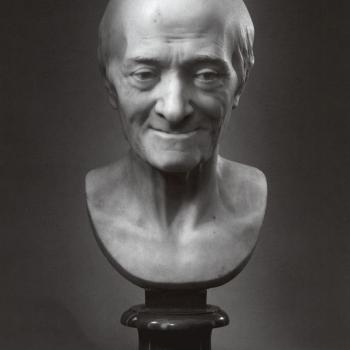 A week ago, the small Episcopal church that I frequently attend moved its morning services out of the sanctuary into a beautiful August morning, heading a half mile down the road to a town park on Narragansett Bay. A small table in the gazebo served as the altar, as twenty-five or so 8:00 service regulars enjoyed a modest version of taking the gospel into the streets (or at least onto the grass).
A week ago, the small Episcopal church that I frequently attend moved its morning services out of the sanctuary into a beautiful August morning, heading a half mile down the road to a town park on Narragansett Bay. A small table in the gazebo served as the altar, as twenty-five or so 8:00 service regulars enjoyed a modest version of taking the gospel into the streets (or at least onto the grass).
During the passing of the peace, one of the regulars at the adult education seminar that I lead after morning services once a month told me a story. Betty, who used to be a fifth-grade teacher, knows that I recently signed a contract to write a book on prayer with the working title “Prayer for People Who Don’t Believe in God.” One of her eleven-year-old students once posed the following problem:
What if there were two babies who were both sick with something that might be fatal. A whole bunch of people pray for the first baby to get better, while no one prays for the second baby. Is God more likely to heal the first baby rather than the second baby?
It’s a tough scenario, going straight to the heart of the many problems that accompany the standard story about prayer that many of us were taught. If the answer to the fifth-grader’s questions is “yes,” then apparently we’re dealing with a deity who is “a respecter of persons,” a narcissistic and needy God whose favor is gained and attention is attracted by saying the right words in the right ways. If the answer is “no,” then what is the purpose of prayer? What is it for?
Betty said that she responded to her student simply by saying that “it doesn’t work that way.” I hope she’s right, because a God for whom prayer is a transaction, a “you do this, then I’ll do that” sort of deity, is not one that I’m particularly interested in worshipping or following. There are any number of verses in scripture that, taken out of context, can be used to support such a transactional model of prayer. Dig into the texts a bit, though, and you find that the message from the divine in both the Hebrew scriptures and the New Testament is, to put it bluntly, mixed and inconclusive concerning prayer.
On some pages one finds excruciatingly detailed instructions on how to pray, sacrifice, and ensure that God will hopefully be pleased, or at the very least not annoyed, with our attempts at contact and communication. Elsewhere the divine seems far more interested in what’s going on in the human heart than in the words we say and the things we do to attract divine attention. In the gospels, Jesus regularly criticizes the very persons who are the “experts” at prayer as being hypocrites and caring about form rather than substance. In telling her student that prayer doesn’t work like the sick infants scenario suggests, Betty appears to be on solid ground.
But, of course, the obvious follow-up question is “Well, then, how does prayer work?” What’s it for? It’s one thing to spend a lot of time and energy describing what prayer is not, but it’s something else entirely to identify what it is. One of the first things that students learn in an introductory logic course is that it is impossible to define anything by simply making a lengthy list of what that thing is not. Pick anything you wish to define—call it “X’—and start listing the things that “X” is not. “X is not a stapler, X is not a cow, X is not a telephone, X is not a coffee cup,” and so on. All of these are true statements, but none get us any closer to what X is. A lifetime of compiling items that X is not fails to get us any closer. As Socrates used to insist, often to the frustration and annoyance of those conversing with him, a true definition must identify the “essence” of what is being defined, that “something” that makes what is being defined unique and different from everything else.
Good luck with that in the case of prayer. Annie Dillard once described “liturgy” as “certain words which people have successfully addressed to God without their getting killed”; maybe that’s the best way to think about prayer as well. Whatever prayer is for, it is energized by the natural human desire to reach beyond ourselves. Since what is greater than us is, almost by definition, impossible to encapsulate or understand fully, perhaps we would do best to look toward ourselves when seeking to understand prayer. When we ask what prayer is for, perhaps we are asking a question about ourselves rather than about God.
In Luke’s gospel, Jesus tells the story of two men who went to the Temple area to pray. The first was a Pharisee, an expert in all things concerning God and holiness, a person who, if anyone, should know how to pray effectively. The Pharisee’s prayer, offered in public view, expresses his gratitude to God for making him such a fine fellow, a person who obeys the rules, does the right things, and recognizes divine favor when he sees it. The second man, a tax collector, offers a prayer out of the public eye of great simplicity: “God, be merciful to me a sinner.” Jesus, of course, favors the second man’s prayer, noting that “everyone who exalts himself will be humbled, and the one who humbles himself will be exalted.”
It is worth noting why Jesus favors the second man’s prayer over the first. It’s not about the content of each man’s prayer, but rather about what each man’s words reveal about his character. Humility rather than pride, focusing on internals rather than externals. It seems, at least in this story, that prayer is more about what a person is than about what a person does or says. If so, then when Paul tells the church at Thessalonica to “pray without ceasing,” he’s urging each of them to become a certain sort of person rather than advising them to start a twenty-four hour prayer chain. Seeking to be a prayer is something worth pursuing, regardless of what or who one thinks God might be. As Karen Armstrong points out, prayer sincerely offered as a natural expression, over time, effects change that is worth committing to.
Prayer teaches us to use language in a different way: to thank, praise, and beg pardon wholeheartedly, without holding anything back. And as we do that, we chip away at our egotism and that in turn will make us a force for good to the people around us and make the world a better place.

















